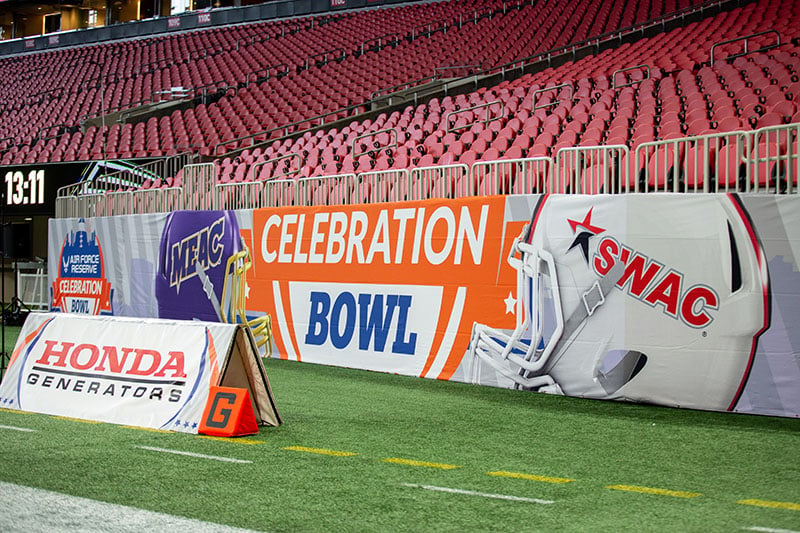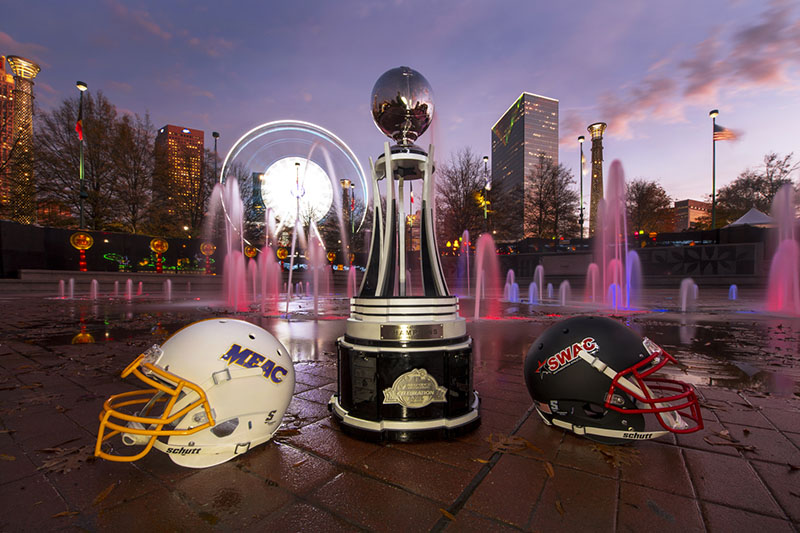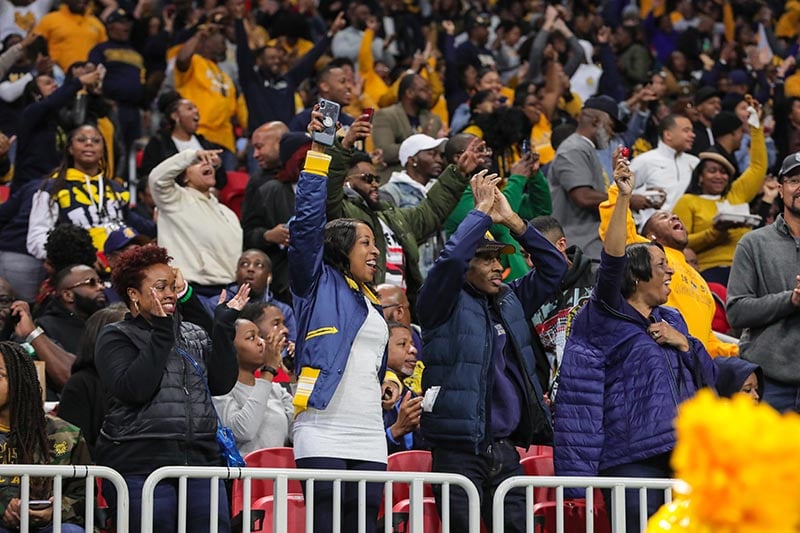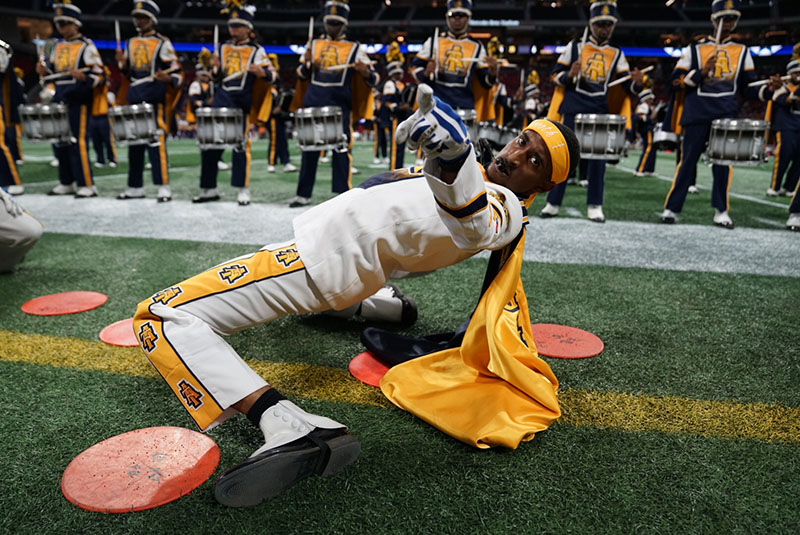More than a game: HBCU culture is celebrated at the Celebration Bowl

The 2021 Celebration Bowl takes place on Dec. 18 at Mercedes Benz Stadium. (Courtesy of ESPN Images)
This Saturday, tens of thousands of people will fill Mercedes-Benz Stadium for the annual Celebration Bowl.
It’s a relatively new bowl game — this year’s is the sixth if you don’t include 2020 — but the experience is far from new for those familiar with HBCU football.
South Carolina State University and Jackson State University will face off in what John Grant, the game’s executive director, calls the Super Bowl for HBCUs.
But the full social, cultural experience exists beyond the game itself, he says.
“We’re putting on a championship football game that has swag,” Grant says.
The Celebration Bowl is more than just a game — it’s an opportunity for Atlantans and those beyond to gather and celebrate the legacy, tradition and heritage of HBCUs. And that desire to gather is stronger than ever after nearly two years of HBCU students and alumni being kept apart due to the pandemic.

Serving Atlanta
The famed Atlanta Football Classic is the Celebration Bowl’s predecessor and it dates back to 1989. It showcased top HBCU talent among prominent rival teams in the SWAC and MEAC conferences before evolving into the bowl game of today that exists as more of a championship game.
Organized by the 100 Black Men of Atlanta, the classic game was a key fundraising event for the organization. And it brought significant positive economic impact to Atlanta each year, Grant says.
Most important to the 100 was the opportunity to hold various symposiums and cultural events to enrich and educate local youths. That tradition of giving back to communities continued as the game evolved into an ESPN production.
“Putting on football games was not the 100’s core business,” says Grant, the former CEO of the 100. “The core business of the organization was providing educational opportunities for kids from challenged communities.”
Today, the Celebration Bowl partners with multiple organizations beyond the 100 to create broader impacts across Atlanta. In the days leading up to Saturday’s game, players have made hospital visits to young fans, visited the Boys & Girls Clubs and there’s a workshop where the NFL connects HBCU students in Atlanta with job opportunities in the NFL.
“If you have an opportunity to partner with a sports network like ESPN that would give the organization the opportunity to tell our story about the work we were doing … from a business perspective it just made sense,” Grant says.
The stars aligned for the Celebration Bowl to be held in Atlanta in other ways, too. It’s a convenient travel destination for SWAC and MEAC teams, and it’s the number one travel destination for African-Americans in the nation, he says, along with being considered the college football capital of the South. These and other factors made Atlanta the easy choice for the location of college football’s only FCS bowl game.
“Having this event in the sports portfolio of the city reinforces Atlanta’s uniqueness in the country as an attractive place for up and coming progressives … it also reinforces the city’s position, I believe, as a truly diverse place for sport, and to live and play and work,” Grant says.
He compares the event to the NFL’s Super Bowl, in which football fans will flock to the game no matter which teams are playing. In this case, HBCU football fans travel to Atlanta despite which teams are playing in the Celebration Bowl. This year, the Celebration Bowl sold out for the first time in its history.
“That’s what we’re building,” Grant says. “No matter who’s playing, you’re coming because it’s the Super Bowl. And it’s our Super Bowl.”

Tamillia Lowery traveled from Florida to see her son, Jeremiah Brown, play for Jackson State. She says she’s felt the excitement and high energy for the game around the city. Everywhere she goes, she says, someone sees her in her Jackson State gear and approaches her to wish the team good luck.
“There’s a lot of us … a lot of African-Americans that are here that can come support,” Lowery says. “And that’s why the ticket sales are so crazy because that’s how it’s been.”
Even from fans of SWAC teams that lost to Jackson State during the season, she’s seen everyone come together for this event.
“We may be [rivals] through the season but when it’s time, we know how to come together as one,” she says. “And it just feels good. It’s a really good feeling.”
Celebrating HBCU culture
Atlanta boasts the largest consortium of HBCUs, the Atlanta University Center Consortium, and the city is home to the largest number of HBCU alumni chapters in the country.
That concentration of HBCU culture converging on the Celebration Bowl produces a similar “vibe” to that of an HBCU homecoming, says John X. Miller, senior HBCU editor for The Undefeated.
People attend the Celebration Bowl and other classic games between HBCUs not only for football but “to revisit this idea that HBCUs are about a perpetuation of friendships, of family [and] of celebrations that enable our community to continue to exist,” Miller says.
“When you go to an HBCU homecoming, it’s about family, it’s about culture, it’s about celebration,” he says. “And so the name ‘the Celebration Bowl’’ is very apropos in that regard.”
And in spite of an ongoing pandemic, this year’s Celebration Bowl is an opportunity for folks to gather, albeit safely, and celebrate getting back together after being apart for so long, he says.

One of the biggest parts of the HBCU football experience is the band. The pageantry and showmanship of a typical HBCU football game will be on full display before, during and after the Celebration Bowl game. In fact, Grant says television viewership triples during halftime.
“Typically an HBCU game’s halftime is the part of the game that everybody’s paying attention to,” Miller says. “Everybody’s in the stands paying attention to what the bands are doing, the competition, the back and forth, the marching and the dancers.”
This year, Disney, the parent company of ESPN, has a strategic focus on HBCUs. Saturday’s Fan Experience dubbed “Disney on the Yard” will take place before the game. The opposing team’s bands will face off in a “jamboree” style battle and local high school bands will be performing as well.
The day’s events will culminate with the 5th Quarter. Miller describes the 5th Quarter tradition as a “Verzuz” battle where both bands remain in the stands after the game and have a “battle of the bands” competition, trading performances of popular songs.
And of course, a football game isn’t a football game without a tailgate.
“When you get there on Saturday and see the celebration that’s going on, the food has been cooked, just the nature of how fans really kind of embrace each other … it’s rivalry, yes, but ultimately, it’s about being there and celebrating your school, your culture and your team,” Miller says.








